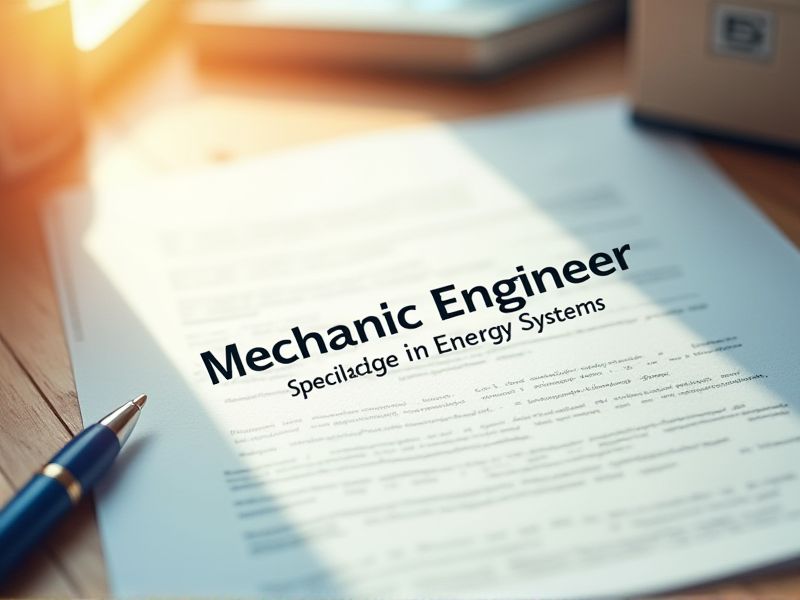
Mechanical engineers specializing in energy systems play a pivotal role in designing and optimizing technologies for sustainable energy production and utilization. With the rapid advancements and regulatory changes in the energy sector, having certain certifications ensures that these professionals stay updated with industry standards and practices. Certifications validate a mechanical engineer's expertise and commitment to continued learning, enhancing their credibility and marketability. Here are some essential certifications you may need as a mechanical engineer specializing in energy systems.
Professional Engineer (PE) License in Mechanical Engineering
A Professional Engineer (PE) license heightens a mechanical engineer's credibility, leading to increased trust from clients and peers when dealing with complex energy systems. The PE license often becomes a requirement as it enables engineers to sign off on projects and ensure compliance with regulatory standards. Possessing a PE license signifies mastery and competence in technical skills, making engineers more competitive in the job market. It provides legal authority and responsibility on projects, which is crucial in ensuring safety and integrity in the design and implementation of energy systems.
Certified Energy Manager (CEM)
The Certified Energy Manager (CEM) credential enhances a mechanical engineer's expertise in energy systems by providing standardized knowledge and recognition in the field. Acquiring CEM leads to improved efficiency in identifying and implementing cost-effective energy solutions, which is critical for optimizing system performance. Possessing CEM can boost career prospects and credibility, as it's often favored by employers looking for qualified energy professionals. With the growing focus on sustainable practices and energy conservation, CEM equips mechanical engineers with the necessary tools to meet stringent energy regulations and sustainability goals.
LEED Accredited Professional (LEED AP)
LEED AP provides mechanical engineers specializing in energy systems with a structured framework to integrate sustainable practices, which is crucial for current green building trends. The credential helps in understanding the LEED rating system, essential for designing energy-efficient systems that meet or exceed client and regulatory expectations. Employers value this accreditation as it demonstrates proficiency in sustainable design principles, thus enhancing job prospects and career advancement. Organizations aiming for LEED certification rely on accredited professionals to guide projects towards achieving optimal energy performance, increasing the necessity for mechanical engineers with this expertise.
Certified Energy Auditor (CEA)
The need for a Certified Energy Auditor (CEA) arises from the demand for mechanical engineers specializing in energy systems to conduct precise energy assessments. This certification enhances the ability to identify energy-saving opportunities and inefficiencies within complex mechanical systems. A CEA credential is recognized as a mark of expertise in the development of efficient energy projects, aligning with regulatory and sustainability standards. Mechanical engineers with CEA certification can provide strategic energy solutions that lead to cost reductions and improved energy performance in industries.
Project Management Professional (PMP)
Securing a PMP certification for a mechanical engineer in energy systems enhances project management skills, promoting systematic planning and execution. This credential fosters improved communication and stakeholder management, minimizing potential risks and delays in energy projects. More efficient resource allocation and budget management become achievable, directly influencing project ROI positively. The PMP certification also distinguishes engineers in competitive job markets, aligning with industry demand for multidisciplinary expertise.
NABCEP Solar Photovoltaic (PV) Certification
NABCEP Solar Photovoltaic (PV) Certification equips a mechanical engineer with specialized knowledge crucial for designing efficient solar energy systems. The certification enhances credibility, making the engineer more competitive in the renewable energy job market. It ensures adherence to industry standards, reducing the likelihood of design or installation errors in solar projects. As the energy sector leans towards sustainable solutions, this certification aligns the engineer with current and future industry demands.
Certified HVAC Designer (CHD)
A Certified HVAC Designer (CHD) brings specialized expertise in designing efficient heating, ventilation, and air conditioning systems, enhancing a mechanical engineer's capabilities in energy systems. Attaining a CHD certification ensures adherence to industry standards, directly influencing energy conservation and system efficiency. It provides a competitive edge in projects requiring sustainable design solutions. The certification bridges the gap between theoretical knowledge and practical application, crucial for optimizing energy use in modern buildings.
Building Energy Modeling Professional (BEMP)
A Building Energy Modeling Professional (BEMP) equips a mechanical engineer with critical skills for accurately simulating and optimizing energy performance in building designs. This expertise aids in reducing overall energy consumption, aligning with increasingly stringent sustainability regulations. By leveraging BEMP techniques, engineers can provide more precise forecasts for energy cost savings, improving project feasibility. These models also enhance design decisions by predicting long-term environmental impacts, reinforcing the engineer's role in sustainable development.
ASHRAE Accredited Professional Certification
ASHRAE Accredited Professional Certification validates a mechanical engineer's expertise in energy-efficient system design, which can lead to increased job opportunities in the green building sector. Employers often prefer hiring certified professionals as it ensures compliance with modern energy standards and practices. A deeper understanding of ASHRAE guidelines enables engineers to design systems that reduce energy consumption and operational costs. Certified professionals contribute to sustainable projects, which aligns with global initiatives to reduce carbon footprints.
Renewable Energy Professional (REP) Certification
The REP Certification enhances a mechanical engineer's credibility in the renewable sector. It signifies expertise in designing and managing sustainable energy systems, meeting industry's evolving demands. Regulation changes often necessitate specialized knowledge, which REP certification ensures. Employers recognize certified professionals as more adept in implementing eco-friendly technologies.
Summary
You can anticipate improved career prospects when a Mechanical Engineer specializing in Energy Systems obtains certifications. These credentials often lead to higher earning potential, as they validate expertise and knowledge in specialized areas. Certified engineers are more likely to gain recognition and trust from employers and clients alike. With increased competency, you may find enhanced opportunities for leadership roles on projects.
